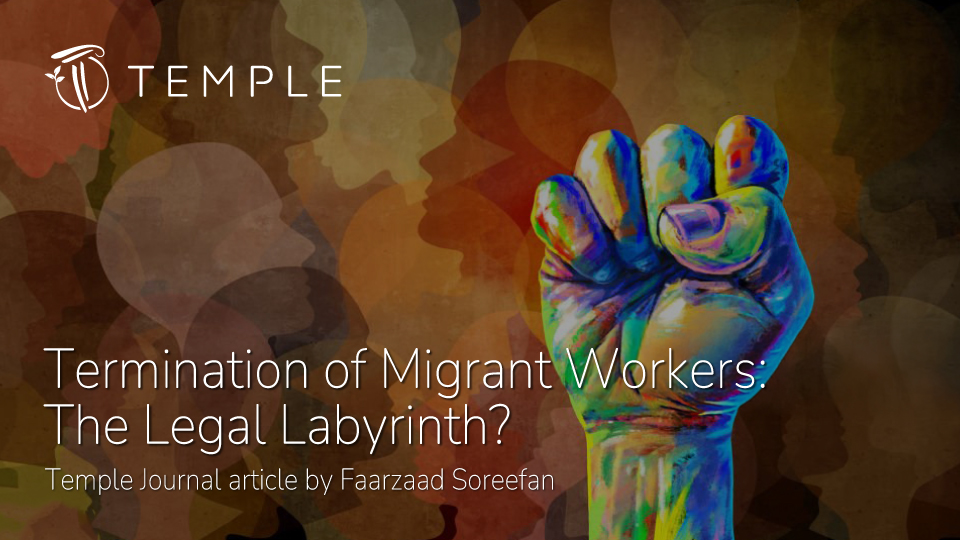Migrant workers have long been an integral part of our labour force for the past decade, expanding to over 36,000[1] individuals of diverse nationalities who are currently employed on the island. This growing presence is not only evident in traditional sectors such as manufacturing, but also in more visible roles, with migrant workers increasingly occupying frontline positions in businesses, including as waitstaff in restaurants or cashiers and helpers in supermarkets. As workers, they are entitled, at most, to the same legal protections afforded to all employees, more specifically, the citizens. However, these protections are contingent upon their immigration status, typically expiring with the termination of their work permits, unless renewed under specific circumstances.
A pertinent question arises regarding the course of action when a migrant worker chooses to terminate their employment contract. Although this scenario is relatively uncommon, in practice, the migrant worker is required to provide notice to the employer. In turn, the employer is responsible for fulfilling its repatriation obligations, which typically involve mainly the provision of a return air ticket. This requirement is codified in the standard employment agreement[2], which is regulated and monitored by the Ministry of Labour and Industrial Relations (the “Ministry”).
The July 2024 amendments to the Workers Rights Act 2019[3] have introduced crucial provisions concerning the termination of employment and repatriation of migrant workers. These amendments, designed to enhance protection for migrant workers, require employers to follow specific procedural steps before repatriation, including giving notice to the supervising officer of the Ministry. However, a significant tension arises when these requirements are juxtaposed with strict procedural timelines governing the disciplinary process, particularly in cases of misconduct.
Procedural Obligations for Termination and Repatriation
[1] Normlex / https://www.webmauritius.com/article/LeMatinalMediaEnglish/Electoral+Year+2024%3A+36%2C000+Foreign+Workers+In+Mauritius/5617233,both accessed 12 October 2024
[2] https://labour.govmu.org/SitePages/SliderReadMore.aspx?IDS=31, accessed 15 October 2024
[3] Finance (Miscellaneous Provisions) Act 2019, section 95
The law as amended[1], outlines clear obligations for employers wishing to terminate the employment of a migrant worker and initiate repatriation. According to the law, an employer intending to repatriate a migrant worker must comply with the following steps:
- Notice to the Ministry: At least 20 working days’ written notice must be provided to the supervising officer of the Ministry responsible for employment.
- Payment of Unpaid Remuneration: The employer is required to settle any outstanding remuneration owed to the worker prior to repatriation.
- Payment of Benefits: The migrant worker must also be paid all benefits to which they are entitled under any other enactment.
Failure to comply with the 20 working days’ notice requirement constitutes an offence under the Workers’ Rights Act[2], and employers who breach this obligation may face penalties, including a fine not exceeding Rs 25,000 and imprisonment for a term not exceeding 2 years.
These provisions underscore the gravity of the employer’s responsibility in ensuring proper notification to the Ministry before repatriating a migrant worker. They additionally serve to ensure that migrant workers receive due compensation and are not unfairly deprived of their entitlements before leaving the jurisdiction. The procedural rigour imposed by these provisions reflects an attempt to safeguard migrant workers, who may otherwise be vulnerable to exploitation, particularly in the final stages of their employment.
Disciplinary Process for Misconduct
The disciplinary process for addressing misconduct within the framework of the Workers’ Rights Act[3] establishes a separate set of procedural obligations for employers. When an employer seeks to terminate a worker for reasons related to misconduct, several critical conditions must be met:
- Notification of Charge: The employer must notify the worker of the alleged misconduct within 10 days of becoming aware of it.
- Opportunity to Respond: The worker must be given an opportunity to respond to the charges.
- Notice of Hearing: The worker is entitled to 7 days’ notice before the oral hearing to prepare an answer to the charges.
- Termination Timeline: If the misconduct is proven, the employer must effect termination within 7 days of the oral hearing
[4] Workers’ Rights Act, section 63(7)
[5] Workers’ Rights Act, section 63(7)
[6] Workers’ Rights Act, section 123(1)(g) [1] Workers’ Rights Act 2019, section 64(2)
This sequence of steps is designed to ensure procedural fairness and protect the worker’s right to a fair hearing before any dismissal is effected. However, these steps, while fostering fairness, impose a time-sensitive structure that may conflict with the employer’s obligations under the repatriation provisions for migrant workers.
Conflict Between Repatriation and Disciplinary Proceedings
The intersection of the procedural requirements for repatriating migrant workers and the disciplinary process presents a significant challenge for employers. On the one hand, the employer is obligated to provide 20 working days’ notice to the Ministry before repatriating a migrant worker. On the other hand, disciplinary proceedings for misconduct are subject to a far more expedited timeline, with the process culminating in termination within 7 days following the hearing.
This raises a number of critical questions:
- Timing of Termination: If a disciplinary hearing results in the immediate termination of a worker’s employment, how is the employer expected to reconcile this with the obligation to give 20 days’ notice before repatriation?
- Obligations During the Interim Period: If the worker is dismissed for misconduct but must remain in the country until the completion of the 20 days’ notice, is the employer required to provide accommodation, such as continued residence in the worker’s dormitory, during this period?
- Financial and Practical Implications: How should employers address the practical and financial implications of supporting a worker whose employment has been terminated but who is yet to be repatriated in view of the notice period?
These issues highlight the potential for procedural contradictions that can place employers in a legally precarious position. The law, as currently drafted, does not provide sufficient clarity on how these overlapping timelines should be managed.
Legal and Practical Implications for Employers
From a legal standpoint, the inconsistency between the timelines for termination and repatriation creates ambiguity. Termination following a disciplinary hearing is intended to be final and immediate, particularly in cases where serious misconduct has been established. However, the requirement to notify the Ministry and provide 20 working days’ notice effectively delays the repatriation of the worker.
Employers may find themselves in a situation where they are compelled to provide ongoing support—whether in terms of accommodation, subsistence, or even remuneration—during this interim period. Moreover, in the absence of clear legislative guidance, employers could face legal disputes. Criminal proceedings add an additional layer of complexity to the intersection of termination for misconduct and repatriation obligations, placing employers in a more vulnerable legal position.
Conclusion
The amendments to the Workers’ Rights Act have introduced essential protections for migrant workers, but they have also created procedural challenges for employers, particularly in the context of disciplinary dismissals for misconduct. The tension between the 20-day notice requirement for repatriation and the more immediate timeline for termination highlights the need for legislative clarity and practical solutions. Employers must navigate these obligations carefully to ensure both compliance with the law and the fair treatment of workers. Ultimately, achieving a balance between safeguarding workers’ rights and preserving employers’ operational flexibility is essential for the smooth functioning of the employment relationship.
[This article is republished from the Temple Journal Second Edition.]


